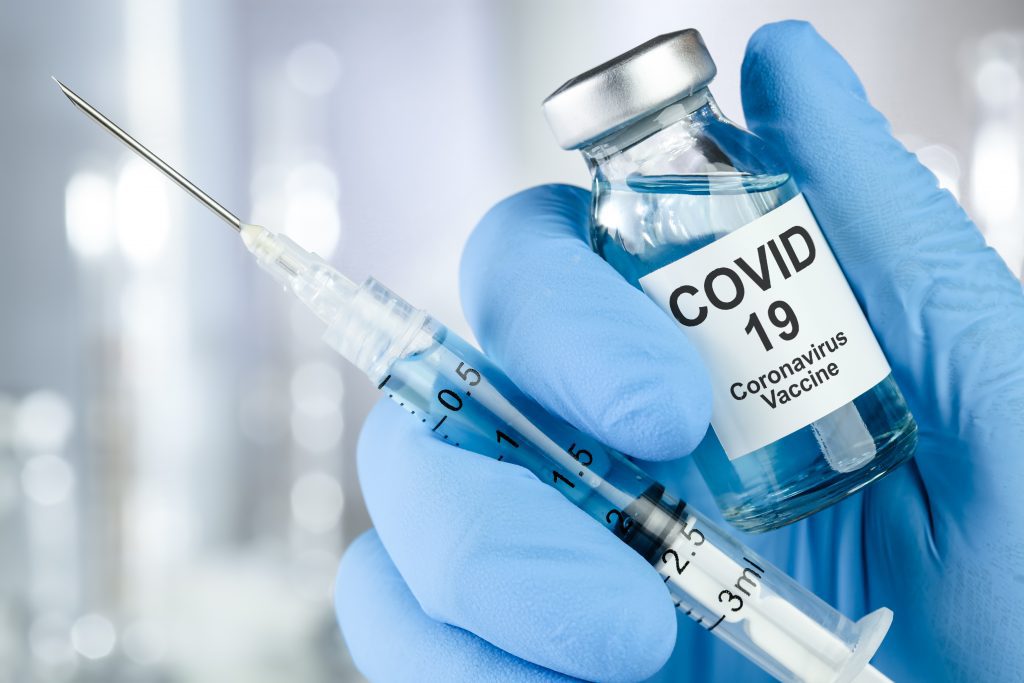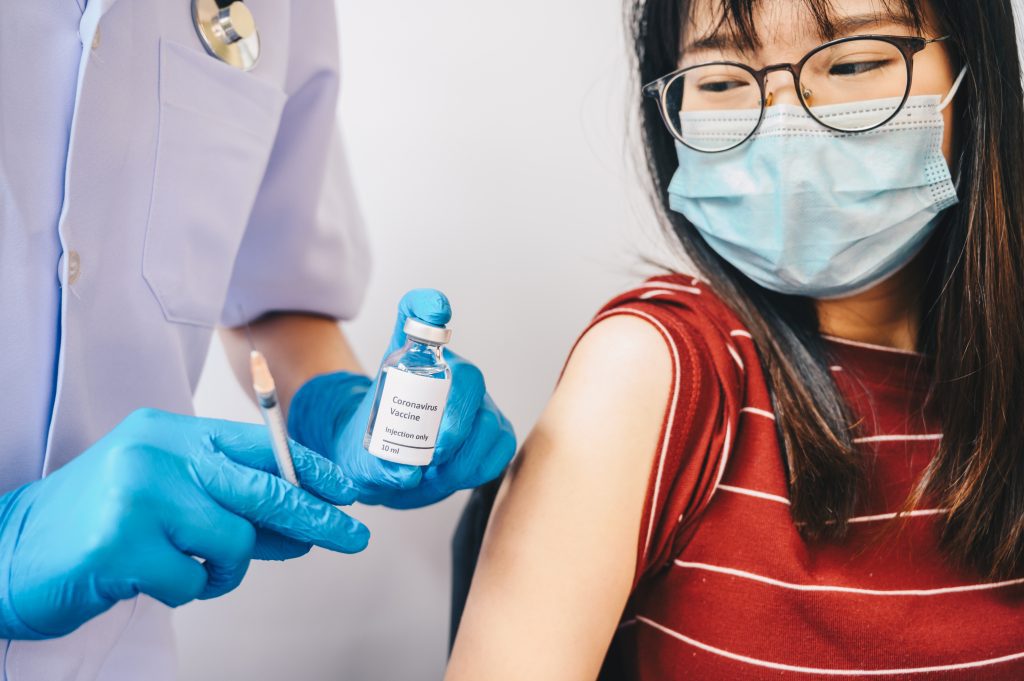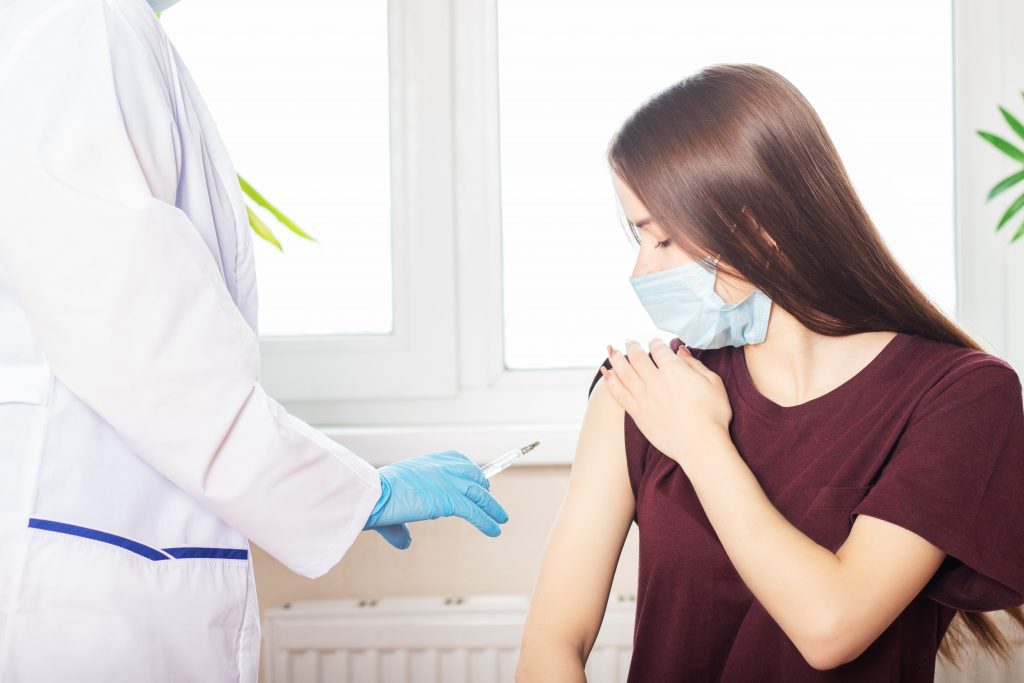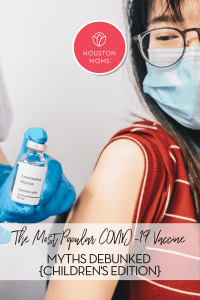Next Level Urgent Care’s Chief Medical Officer, Karen Rakers, MD, is here to debunk some of the most popular COVID-19 vaccine myths circulating on social media.

Myth 1: The vaccine isn’t safe because it was rushed.
The COVID-19 vaccine was developed in record time, but it wasn’t “rushed.” This is in part because scientists had been researching spike proteins in relation to coronaviruses for years. Additionally, most vaccines take a long time to develop, not because of research but because of grant applications and approval processes. The legal components associated with the COVID-19 vaccine were pushed through quickly due to the public health emergency. However, the vaccine itself still underwent stringent testing at each clinical trial phase the same way any other vaccine or medication would.
Myth 2: The vaccine goes against my religion because aborted fetal cells were used to make it.
Pfizer did not use aborted fetal cells to create the COVID-19 vaccine, although fetal cells were used in vaccine testing for Pfizer, Moderna, and Johnson and Johnson. If you’re interested in reading more, here’s a good article on the Catholic Church’s official stance on COVID-19 vaccine.
Myth 3: My child always gets the flu when he gets the flu vaccine. He’s going to get COVID-19 if he gets the COVID-19 vaccine.
The COVID-19 vaccines currently available do not contain any live virus; therefore, they can’t give you COVID-19. The vaccine does cause your body to mount an immune response that gets your body ready to react if it encounters the actual COVID-19 virus in the future. This immune response can result in symptoms that are usually mild and short-lived.
 Myth 4: The vaccine will alter my child’s DNA.
Myth 4: The vaccine will alter my child’s DNA.
The Pfizer COVID-19 vaccine is made with mRNA, which acts as a blueprint for our cells, letting them know how to create a shield against COVID-19. It never enters the nucleus of our cells where DNA is stored and therefore does not combine with our DNA. Additionally, mRNA is very fragile and degrades after about 72 hours in our system.
Myth 5: My child had COVID-19 earlier in the year, so he doesn’t need the vaccine.
Immunity from having actual COVID-19 disease is thought to wane after about three months. Therefore it is recommended to get the COVID-19 vaccine even if you have had COVID-19 in the past.
Myth 6: I don’t think my child needs the COVID-19 vaccine because the survival rate is so high, and children aren’t generally hospitalized for COVID-19.
COVID-19 has a 99% survival rate, which sounds like pretty good odds. However, due to the long-term effects that may arise as a result of COVID-19, survival does not always mean that the patient has a good outcome. Additionally, 1% of everyone that has gotten COVID-19 and died equates to over 3.42M deaths worldwide, and although rare, some children diagnosed with COVID-19 may develop MIS-C, a serious inflammatory disease. Since the death toll from COVID-19 is rapidly rising as new strains emerge, we must work quickly and efficiently to get the majority of our community vaccinated (ideally, 70%-90% of the population). Another way to think about this is that although your child may not become extremely ill if he contracts COVID-19, he could still pass the virus along to elderly or immunocompromised individuals. By getting vaccinated, your child is protecting those around him.

Myth 7: There are long-term effects that will arise from the COVID-19 vaccine.
History tells us that severe or long-term side effects from vaccines are extremely unlikely and the Pfizer vaccine has undergone rigorous investigation just like every other vaccine that we use today. Even with the Johnson & Johnson vaccine, after investigating the handful of cases of blood clots associated with vaccine administration, it was determined that the benefits of the vaccine outweighed the risks.
Myth 8: The COVID-19 vaccine will lead to infertility.
Although there is social media buzz regarding COVID-19 vaccines causing infertility, there is no scientific basis for this claim. Infertility is not known to result from COVID-19 disease, which indicates that an immune response to the virus, whether from natural infection or vaccination, is not a cause of infertility.
Myth 9: The COVID-19 vaccine includes a tracking device used by the government.
This is simply not true. If the government wanted to track you or your child, they would probably use an existing platform like social media or cell phone usage.
Myth 10: The COVID-19 vaccine causes severe reactions in most people who get it.
The rate of severe reaction to a COVID-19 vaccine is extremely low. As with any substance introduced to the human body, allergic reactions, including severe anaphylaxis, can occur. Because of this, most vaccine providers are monitoring patients for 15-30 minutes following vaccination.
Moral of the story: The COVID-19 vaccine is not only safe but highly effective. Pfizer has proven to be 95% effective at preventing COVID-19 just two weeks after receipt of the second dose. If you were initially on the fence about getting your child vaccinated, we hope these explanations have helped to ease your concerns.
Connect with Next Level Urgent Care
Website | Facebook | Instagram | Twitter
 About Karen Rakers, MD
About Karen Rakers, MD
Dr. Rakers serves as the Chief Medical Officer of Next Level Health & Wellness, providing management and oversight of 6 onsite employee health clinics and Next Level PRIME, our direct to employer primary care model. Prior to working at Next Level, Dr. Rakers worked for many years as a primary care physician and is passionate about preventive medicine and chronic disease management. She also serves on the board of directors of the Houston Business Coalition on Health. Dr. Rakers earned her medical degree from Saint Louis University School of Medicine in St. Louis, Missouri and then completed a family medicine residency at MacNeal Hospital in Berwyn, Illinois. She is certified by the American Board of Family Medicine. In her free time, Dr. Rakers enjoys travel, attending her three daughters’ many extra-curricular activities, work-outs with friends, participating in book club, and dining out with her husband.

















